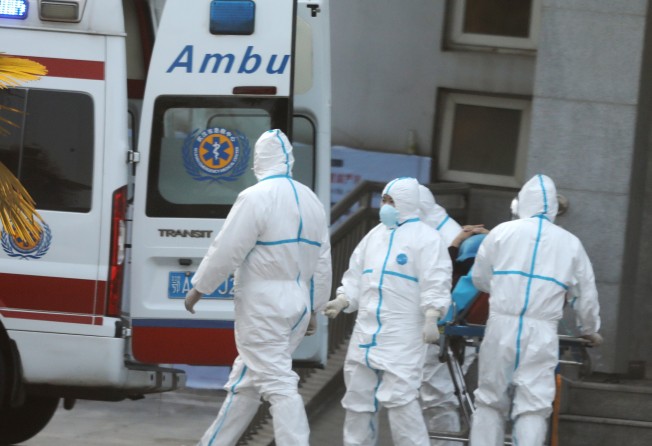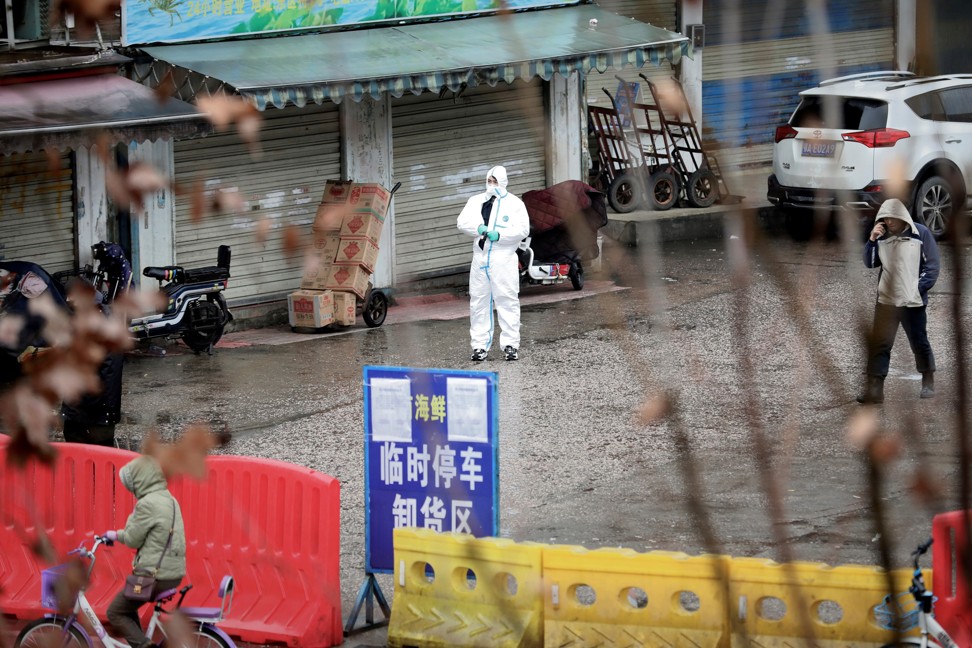China virus death toll rises to 6 as city at epicentre steps up controls
- Quarantine the most effective way to stop further spread of coronavirus, Sars expert says
- Wuhan, the heart of the outbreak, ramps up checks on travellers to and from the city

The death toll from a previously unknown virus that has sickened more than 300 people across China has risen to six, as the central city of Wuhan, the epicentre of the outbreak, stepped up controls to contain its spread.
Chinese officials reported on Tuesday that the total number of confirmed cases had jumped to 309, the bulk of them in Hubei province. Others were reported in Beijing, Shanghai, Tianjin, Guangdong, Zhejiang, Henan and Chongqing.
Cases have also been confirmed in Taiwan, South Korea, Japan and Thailand, while Hong Kong reported 118 suspected cases, including 88 people who have been discharged.
On Tuesday, Zhong Nanshan, one of China’s leading specialists on communicable diseases, stressed that quarantine was the most effective method to prevent further spread, since the virus could be spread between people.
“Human-to-human transmission [of the virus] was proved in Guangzhou. In Wuhan, medical workers and patients infected each other by being in the same room, and in the Guangzhou case, the patients were infected by two relatives who visited Wuhan,” Zhong said in Guangzhou.
“As soon as it spreads from human to human, quarantine must be the first priority. At the moment, I don’t think quarantine has been implemented thoroughly enough.”
Zhong, who played a pivotal role in China’s fight against another coronavirus – severe acute respiratory syndrome (Sars) – 17 years ago, expressed confidence that this time the outbreak could be contained if the quarantine measures were strengthened.
“I think this method is the best one, and it would be wise and effective if we move forward with this strategy. At the moment, there is no effective drug for treatment for this new strain of coronavirus,” he said.
According to Wuhan health authorities, 15 medical personnel in the city had contracted the virus, confirming that it is spreading by human transmission and raising concerns that people at the most virulent stage of infection – so-called super-spreaders – could infect many others.
Authorities announced tightened inspection measures over travellers to and from the city, including a ban on outbound tour groups, and vehicle spot checks for wildlife and live animals.
The city also said it had set up a specialist epidemic prevention and control centre to handle the outbreak. The new command centre will monitor agricultural markets, and oversee screening of passengers for fever at public transport hubs. Mass public events where there is a risk of transmission will be cancelled.
The city has allocated 800 beds at three hospitals to treat patients with the disease, with a further 1,200 beds available at other medical facilities.
In addition, the government will cover the medical expenses of patients with the virus in an effort to encourage people to seek treatment.
The National Health Commission upgraded the pneumonia caused by the new strain to a Class B infectious disease but said it would use the stricter control measures for a Class A disease to handle the outbreak, meaning any infection nationwide must be reported within two hours and monitored.
A Class B classification gives the central government the power to shut down travel to, from and within a city, and to take other emergency measures that would effectively shut a city down.
A group of WHO experts had visited Wuhan to investigate the outbreak and meet health officials, the commission said.
The WHO visit coincided with a separate trip to Wuhan by a group of Chinese health experts, led by Zhong. Zhong said on Monday night that the virus was transmitted between humans and was likely to have originated from wild animals.
“The key to controlling the spread of the disease now is about preventing the emergence of a super-spreader [of the virus],” Zhong said.
According to Zhong, the priority for Wuhan – a city of 11 million people, which is more than London or New York – was to curb the spread of the virus by banning people with symptoms from leaving the city.
Reports that the virus was spreading raised particular concern, as more than 450 million people are expected to take trips over the Lunar New Year holiday period, according to official estimates.
Wuhan has an international airport and is one of the country’s major rail network hubs, with three major train stations.
Tianjin Airlines said on Tuesday that it would offer ticket refunds and reschedule travellers who had booked trips via Wuhan Tianhe International Airport for between January 15 and February 29.
Other carriers, including China Southern Airlines, Hainan Airlines, Shenzhen Airlines, Kunming Airlines and Urumqi Air, made similar offers, Beijing Business Daily reported.
Travel booking platform Ctrip said it would offer free cancellations on all bookings to those diagnosed with the new strain of coronavirus, as well as travellers who had been quarantined or suspected to have the illness. It also would provide free cancellations on bookings for Wuhan hotels, tourist attractions and car rentals to all travellers.

Raina MacIntyre, professor of global biosecurity at the University of New South Wales in Sydney, said it was possible that super-spreaders could emerge during this outbreak, they did during the 2002-03 Sars epidemic.
MacIntyre said a super-spreader was someone who “sheds more virus and spreads the virus more intensely and effectively than most other people who are infected”.
According to a 2011 study in the International Journal of Infectious Diseases, one super-spreader of the Sars virus was likely to have infected 329 other residents of the Amoy Gardens housing complex in Hong Kong.
“We need to focus on surveillance and screening in high risk situations, early detection and isolation of cases, contact tracing, and infection control measures such as PPE [personal protective equipment] and hand washing,” she said.
Purchase the China AI Report 2020 brought to you by SCMP Research and enjoy a 20% discount (original price US$400). This 60-page all new intelligence report gives you first-hand insights and analysis into the latest industry developments and intelligence about China AI. Get exclusive access to our webinars for continuous learning, and interact with China AI executives in live Q&A. Offer valid until 31 March 2020.